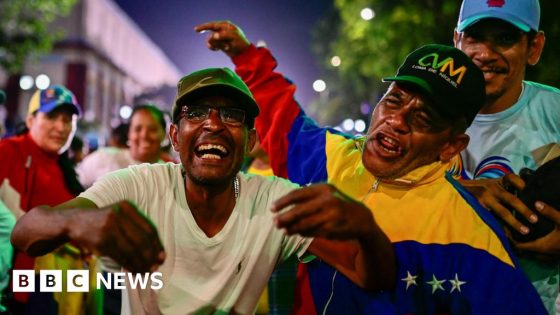As the electoral authorities, which Nicolas Maduro controls, announced he’d won a third term in office, an instant crackle of fireworks rippled around the Venezuelan Caracas.
The city soundtracked in a carefully curated way, like many things in this election.
The opposition claimed instantly that they, not the president, had won.
But you wouldn’t know this from watching the news here.
Television screens up and down the country only showed jubilant crowds, draped in the Venezuelan flag, dancing and cheering on the president.
Nicolas Maduro does have some loyal supporters still, known as “Chavistas” after his mentor Hugo Chavez and the brand of socialism he created.
But their numbers are highly disputed, and this election result is far from over.
As the city hums back into life this morning, the government faces pressure from both the international community and the opposition here to explain their numbers – after the opposition were so far ahead in the polls beforehand.
There are some things that are indisputable. Some which I, as an observer on the ground, was witness to.
There were the huge queues at polling stations, but only tiny amounts of people being let in at one time.
This led to accusations of deliberate delays, perhaps in the hope some people would give up and go home.
When our BBC team arrived at one polling station, the organiser of the station took a call saying the international media were there. 150 people were then suddenly allowed to be admitted.
There were some poll stations that didn’t open at all, leading to protests and clashes with the authorities.
There were allegations that some of those who work for the state, including police students, were told how to vote.
There was the fact President Maduro’s face remained emblazoned above some poll stations even on voting day.
His face lines almost every street in Caracas, with his governing party paying for incentives for people to support him – buses put on for people to attend his rallies, and free food parcels handed out.
Even prior to allegations of explicit fraud the question was asked: Is this contest fair?
Opposition candidates were banned from running, opposition aides detained, many Venezuelans overseas struggled to register to vote and many international election observers were disinvited.
All of these were seen as attempts to suppress the opposition vote. The opposition were so far ahead in opinion polls that many analysts believed these tactics were necessary as it would be hard for the government to claim a win without seeming far-fetched.
But now that they have done just that, the opposition is alleging a more specific type of fraud.
They claim they only had access to 30% of the printed “receipts” from electronic voting machines around the country, to check that the machine’s results matched those electronically sent to the electoral council.
They think this could mean more potential for the electronic figures to be tampered with and allege many of their observers were not allowed into the counts.
The government dispute any wrongdoing, and instead have accused “foreign governments” of an “intervention operation”.
So, what will happen next?
There are still a lot of unknowns. The opposition say they will announce in the coming days how they plan to challenge the results.
They and the international community have asked for proof of the numbers the government has put out, as granular as count by count.
It is hard to see how President Maduro avoids these calls without serious consequences for the country.
In his victory speech, he referenced US sanctions imposed after the last elections were seen as unfair.
They have hit the country’s already flailing economy. Millions of Venezuelans have fled, and half the country live in poverty.
How everyone else responds will be key now.
The international community has been divided for some time over how to respond to Venezuela, with some governments’ conceding privately that the sanctions haven’t “worked”, either by incentivising regime change or compelling President Maduro to hold fair elections.
They are also used as an excuse by President Maduro, and his supporters, for the country’s woes.
The future of Venezuela and whether it can rebuild matters for the rest of the world – mass emigration has fuelled a migration crisis on the US border, its vast oil reserves remain relatively unusable, and it remains an ally for Russia, China, Cuba and Iran in the West.
The opposition, meanwhile, aren’t set to back down without putting up a fight.
Source Agencies



